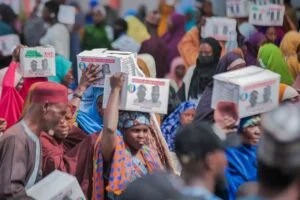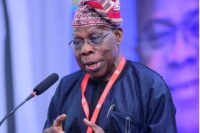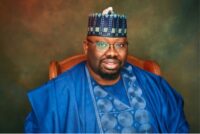After 35 years of active service to the nation, 542 senior Non-Commissioned Officers last month, officially retired from the Nigerian Armed Forces—leaving behind the regimentation of military life for the uncharted waters of civilian existence. Their transition was marked by a poignant passing-out ceremony at the Nigerian Armed Forces Resettlement Centre (NAFRC), Oshodi, Lagos, following a rigorous six-month vocational training designed to equip them with the tools, knowledge and confidence needed to begin life anew. Chiemelie Ezeobi writes that the event was not only a celebration of their sacrifice and service, but a hopeful glimpse into their future as entrepreneurs, community leaders and productive citizens
It was a moment of reflection, pride and transition at the Nigerian Armed Forces Resettlement Centre (NAFRC), Oshodi, Lagos, as 542 senior Non-Commissioned Officers passed out after a six-month pre-retirement course, formally marking the end of their military service and the beginning of a new chapter in civil life.
Drawn from the Nigerian Army (362), Nigerian Navy (134), and Nigerian Air Force (46), the retirees had spent the last three and a half decades serving the nation in various capacities, enduring the rigours and demands of military life. But on this occasion, the boots and berets gave way to hope, laughter, and a new sense of purpose.
They had joined the Armed Forces as young men and women—disciplined, idealistic and resolute in their commitment to defending the territorial integrity of Nigeria. Over the years, they rose through the ranks, fought battles both visible and invisible, served in volatile regions, kept vigil over national assets and endured personal sacrifices.
Now, with the passing out of Course 1/2025, their stories continue—not as soldiers in uniform but as citizens empowered with new vocational and management skills, ready to thrive in civilian life.
A Centre with a Purpose
Speaking at the ceremony, the Commandant of NAFRC, Air Vice Marshal Bashir Mamman, announced that the Centre has trained over 53,000 military personnel, para-military officers, and allied armed forces members since inception.
“The Centre has remained committed to its core mandate of providing vocational and entrepreneurial training to retiring personnel of the Armed Forces,” he said. “This, in turn, enables them to contribute meaningfully to their various communities and prevents them from becoming a liability to society.”
The six-month training course, which was conducted entirely at the NAFRC in Oshodi, Lagos, equipped participants with practical skills in management, fashion, fine arts, soap and cosmetics production, agriculture, woodwork, building and civil engineering, electrical installation, auto mechanics, welding and fabrication, music, food processing, and information technology, among others.
The curriculum is designed not only to prepare participants for self-employment but also to encourage them to become job creators, thereby contributing to national development in retirement.
Building for the Future
According to AVM Mamman, some reforms and infrastructural upgrades have been undertaken under his leadership and these include the renovation of the NAFRC Headquarters reception, refurbishment of the Corporal and Below Quarters, and the construction of a seat-out area for participants.
“We also energised the Lt.-Gen. T.A. Lagbaja Block, furnished participants’ accommodation, installed solar panel streetlights and procured a Toyota Hilux,” he added. “We took delivery of a Jet Mover Ambulance to improve healthcare services and commenced the quarterly training of Mid and Senior Level Cadre Officers in Entrepreneurship and Management.”
In partnership with the Corporate Affairs Commission (CAC), the Centre also introduced lectures on the importance of business registration, aimed at educating participants on legal recognition, business credibility, access to financial services, and tax benefits.
Despite these strides, the AVM acknowledged that challenges persist. “Delayed release of funds, healthcare and maintenance requirements, and feeding logistics have continued to pose serious constraints,” he said. “Nonetheless, the Centre continues to explore progressive solutions, including the development of NAFRC’s 30-hectare agricultural land at Epe, Lagos, to expand capacity in agriculture, waste management and renewable energy.”
A New Digital Frontier
As part of its drive towards modernisation, the Centre has begun upgrading its Information Technology facilities to host a vibrant website and an e-learning platform. “This will allow participants who may be unable to physically attend courses to still benefit from the programme,” AVM Mamman explained. “It will also enable us to track the vocational progress of graduates over time.”
NAFRC is also extending its training beyond military personnel. Youths from the surrounding communities have begun to benefit from the Centre’s Corporate Social Responsibility initiative, which provides free vocational training. Plans are also underway to institutionalise similar training for widows and orphans of deceased personnel.
AVM Mamman thanked President Bola Tinubu for approving an increment in the starter packs for participants, and also expressed gratitude to the Chief of Defence Staff, General Christopher Musa, and the Service Chiefs for their strategic support and leadership.
Tribute to Courage, Sacrifice and Discipline
Representing the Chief of Army Staff (COAS), Lt.-Gen. Olufemi Oluyede, at the event, Major General Aligbe Obhiozele, Commander of the Training and Doctrine Command (TRADOC), lauded the retirees for their unwavering service and dedication to the nation.
“Today’s ceremony is a tribute to your courage, sacrifice, discipline, resilience, selflessness and unwavering commitment,” he said. “As you transition to civilian life, remember that you now become the planners and executors of your personal daily activities. This may sound exciting, but it requires discipline and effective time management.”
He urged them to maintain their honour and integrity even outside the barracks. “The society will continue to expect a high standard of ethics and conduct from you,” he added. “You must prove that you passed through a disciplined system and be positive influencers in your communities.”
According to him, their respective communities would now look to them to support local safety and security efforts, including tackling community-based crimes.
“Please, be advocates of peace and make yourselves available in providing such assistance within the ambit of the law,” the COAS advised.
Charge for New Realities
While commending their service, the COAS did not shy away from cautioning them about the potential pitfalls of post-service life. “Challenges may include inadequate resources, poor health management, extravagant lifestyle, and deceit by fraudulent individuals,” he said. “It is therefore unwise to venture into unfamiliar businesses or live beyond your means.”
He reminded them that the essence of the training at NAFRC was to equip them for these realities. “I enjoin you to apply the experience and skills you have gained for a productive economic life. You are and will always remain heroes of our land.”
He expressed appreciation to the leadership of NAFRC for sustaining a high standard of human resource development and pledged continued support from the Armed Forces to transform the Centre into a globally recognised institution of excellence in vocational training.
“I thank President Bola Tinubu for his unwavering support for the Armed Forces and the welfare of both serving and retired personnel,” he concluded.
A Bittersweet Farewell
For the retirees, the passing out ceremony was more than a formality—it was a solemn, reflective and proud moment. Having spent over three decades in the disciplined world of the military, adjusting to civilian life would be a significant shift. Yet, many expressed optimism and enthusiasm for the new journey ahead.
“NAFRC has opened our eyes to what is possible beyond military service,” one of the retirees said. “I am leaving here with the confidence that I can sustain myself and even employ others.”
Another retiree noted: “The soap-making and agriculture training have given me a new purpose. I plan to start a farm and teach my children everything I’ve learnt here.”
In a world of uncertainty, these 542 men and women, now former warriors, have returned to society not as burdens, but as builders—armed not with weapons, but with skills, values, and a renewed sense of purpose. The uniform may be gone, but the discipline and patriotism remain.
Caption
Major General Aligbe Obhiozele, Commander of the Training and Doctrine Command (TRADOC) and
Commandant of NAFRC, Air Vice Marshal Bashir Mamman with Course 1/2025 542 senior Non-Commissioned Officers at their passing out parade at the Nigerian Armed Forces Resettlement Centre (NAFRC), Oshodi, Lagos, after their six-month pre-retirement course
L-R: Rear Admiral Shettima; Major General Aligbe Obhiozele, Commander TRADOC; NAFRC Commandant, Air Vice Marshal Bashir Mammam; and National President DEPOWA, Mrs. Oghogho Musa at the event


















Leave a comment